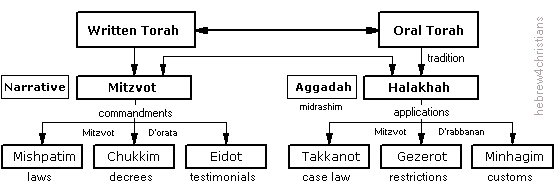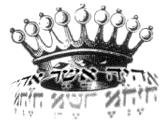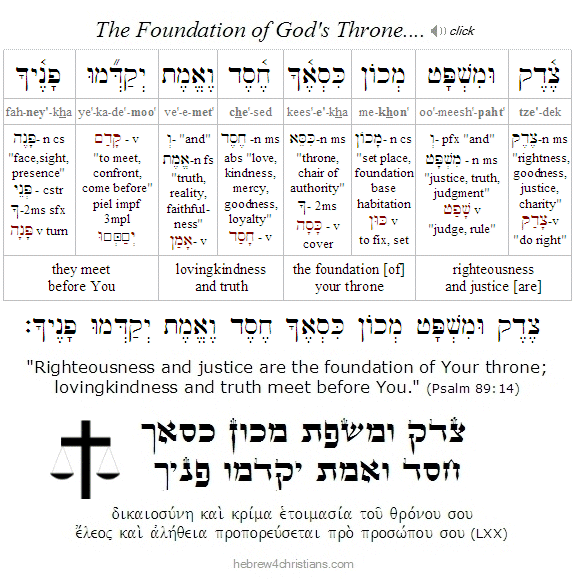|
Last week's Torah portion (Yitro) explained that exactly seven weeks after the Exodus from Egypt, Moses gathered the Israelites at the foot of Mount Sinai to enter into covenant with the LORD. In a dramatic display of thunder, lightning, billowing smoke and fire, the LORD then descended upon the mountain and recited the Ten Commandments to the people. Upon hearing the law's moral requirements, however, the people shrank back in fear and begged Moses to be their mediator before God. The people then stood far off while Moses alone drew near to the thick darkness to receive the details of the Torah from the LORD.
This week's Torah portion begins with Moses in the midst of the "thick darkness" receiving additional rules (i.e., mishpatim, "legal judgments") regarding civil life for the newly redeemed people. The sages count 53 distinct commandments listed in this portion of the Torah, making it one of the most "legalistic" sections of the Bible. Civil laws, liability laws, criminal laws, agricultural laws, financial laws, family purity laws, Sabbath laws, and holiday laws are all given in this portion.
In Jewish thought, the word "Torah" (תּוֹרָה) is a general concept that implies a wide range of related ideas and concepts that focus on discerning God's will. A primary distinction is between the written Torah, on the one hand, and the oral Torah on the other. The written Torah, called shebichtav (שֶׁבִּכְתָב, "that which is written"), refers to the text that has been meticulously transmitted since the time of Moses in the form of a Sefer Torah (i.e., a kosher Torah scroll). The oral Torah, on the other hand, is called shebal peh (שֶׁבְּעַל פֶּה, "that which is oral"), and refers to legal and interpretative traditions handed down by word of mouth until these were codified in the Mishnah and Gemara (i.e., the Talmud). The Oral tradition further includes the Midrash (traditional exegesis), the Responsa (questions and answers given by "poskim," or legal scholars), the Shulchan Aruch (16th century codification of Jewish case law), and various other commentaries handed down over the centuries. Some people further claim that "Kabbalah" is also contained within oral tradition, though strictly speaking it is not regarded as part of the Oral Torah as understood in Jewish tradition.
Jewish thought maintains that the written Torah and the oral Torah are complementary, since Moses himself established the role of judges and law courts in the written Torah (Exod. 18:13-26; Num. 11:24-29; Deut. 16:18-20; 17:8-12), and ultimately the oral Torah derives its justification and substance from the written revelation. Indeed it is somewhat artificial to distinguish between the two in practice, since the written Torah was preserved through tradition (i.e., the scribal transmission, the books to be included in the canon, etc.), just as the oral Torah was validated by the written words of the Torah scroll itself. Moreover, within both of these "Torahs" we can make further distinctions. For example, in the written Torah there is both narrative (alilah) and Gods' explicit commandments (mitzvot), which roughly corresponds to the distinction between "aggadic" (homiletical) and "halakhic" (legal) literature found in the oral Torah. In addition, just as the 613 mitzvot of the written Torah can be subdivided into the categories of mishpatim (laws), chukkot (decrees), and eidot (testimonials), so the Jewish legal tradition discusses the corresponding ideas of takkanot (case laws), gezerot (rabbinical decrees), and minhagim (customs). In short, there is a sort of circular reasoning involved in the traditional Jewish idea of Torah: The written Torah was passed down (validated) by means of the oral Torah; but the oral Torah derives its authority from the written Torah:
 |
It is important to keep these distinctions in mind whenever we discuss the meaning of the word "Torah." Many Christians tend to oversimplify the issue by regarding the Torah as "the law" or the first five books of Moses. For most Jews, however, the word "Torah" encompasses the collective (and ongoing) discussion about the meaning and significance of the words of Moses (and of the prophets) that has been taking place for thousands of years. Understood in this sense, Torah represents the collective "memory" of the Jewish people as they have reasoned through questions about law, custom and tradition over the centuries.
Of course the Christian faith has a somewhat similar relationship between the authoritative texts of the Bible, on the one hand, and the influence of religious tradition on the other. The transmission of the Greek New Testament, the decision to include certain books into the canon (and to exclude others), the basic theological interpretations that defined the idea of the "church," the role of the sacraments, and so on, are just as much a part of Christian history as they are a part of Jewish history.
To illustrate the process of understanding a particular mishpat, or "rule" given in the written Torah, we take as an example the commandment to "distance yourself from a false word" (i.e., מִדְּבַר־שֶׁקֶר תִּרְחָק) found in this week's Torah portion (Exod. 23:7). First note that the Hebrew text itself does not define midbar-sheker (a "false word," or a "false thing"), nor does it define the verb used in this phrase (i.e., rachak: רָחַק), and therefore we are forced to look to tradition (i.e., lexicons, translations, commentaries, etc.) to help determine the meaning of this commandment. Most reputable lexicons identify the root of the verb to mean "being far" or "distant" from something, and then go on to provide basic usage examples found in the Scriptures. Apart from this sort of linguistic information, however, we must look to Jewish tradition (masorah) to better understand the meaning of this text. When we do so, we discover that the sages noted that the verb rachak was not used with other commandments in the Torah, and therefore they were careful to study the context of the commandment as it appears in the surrounding flow of the text itself (i.e., the litany of rules to be used when deciding cases of civil law and matters of jurisprudence). The sages then compared this with related concepts revealed in the Torah, such as the requirement for judges to be truthful and fair in their decisions, to refrain from accepting bribes, to fear God and not man, and so on (Exod. 18:21; Deut. 1:16, etc.). After going through this sort of process, the sages began to dialog about the intent of the commandment as a call to preserve the integrity of the judicial process itself. The rule that a judge must be "far removed from a false matter" is therefore understood as the prohibition from taking a bribe in matters of civil law.
The sages further compared the commandment to "distance yourself from a false matter" with the more general commandment found in the Book of Leviticus: "You shall not deal falsely with one another" (i.e., לא־תְכַחֲשׁו) in Lev. 19:11). According to most of the traditional commentators, truth-telling is regarded as a moral imperative of Torah - whether in matters of civil law or in interpersonal relationships. Indeed, throughout the ethical teaching of the Scriptures, the tzaddik, the righteous man, is always described as yashar - a person full of integrity and moral righteousness. We have a moral obligation, in other words, to speak truthfully, and an entire area of mussar (traditional Jewish moral education) concerns the topics of lashon hara (evil talk), dibbur emet (truth-telling), and so on.
Nonetheless, the sages note that things are not always "black and white," and they therefore wrestled with the question of whether it was ever permissible to set aside the obligation to speak the truth in certain mitigating circumstances. For example, in Jewish tradition, Aaron is known as a man "who loved peace, pursued peace, and created peace between man and his friend" (Sanhedrin 6b). The sages note that whenever a dispute developed between two Israelites, Aaron would go to each party and say that the other person deeply regretted the quarrel. Aaron's "fabrications" were intended to teach the greater truth that love and peace were more important than the facts of a given case. Likewise the Talmud insists that it is appropriate to sing "How beautiful and charming is the bride" at a wedding, even if it is clear that she is not. The House of Shammai had argued that people should refrain from doing so, based on the Torah's commandment to "distance yourself from a false matter," whereas the House of Hillel argued that the obligation to avoid embarrassing the bride (and groom) takes precedence over the obligation to demand that judgments be factually correct. Sometimes, for the sake of peace, the truth may be "overlooked" for the sake of love (1 Pet. 4:8; Prov. 17:9). In this connection we note how Joseph intended to spare Mary shame and disgrace after it became known that she was pregnant with Yeshua (Matt. 1:19).
The sages further argue that this approach may be seen in the Torah itself. For instance, when the three angels appeared before Abraham and Sarah to announce the birth of Isaac, Sarah laughed and said within herself, "After I am worn out and my husband is so old, shall I enjoy this pleasure?" The LORD, however, did not repeat Sarah's words but abbreviated them as: "Shall I indeed bear a child, now that I am old?" (Gen. 18:12-13). According to the traditional commentaries, the LORD "overlooked" Sarah's reference to Abraham's old age in order to keep the peace between them....
All of this discussion is meant to lead to practical application and to discern principles of conduct by which we should strive to order our decisions. As I've mentioned elsewhere, if deception is sometimes "allowed" for the sake of peace and love, the converse also appears to be true. Truth can be used as a weapon in the service of the kingdom of Hell... In other words, sometimes true words and actions performed in an unloving or spiteful manner are morally blameworthy. Dietrich Bonhoeffer (1906–1945) tells the story about how a teacher once humiliated one of her students by standing him up in front of the class to ask whether his father -- notoriously known as the town drunk -- had been out drinking the night before. The little boy knew the accusation was factually true but bravely announced "No." When the teacher mockingly asked him again, pressing him for "the truth," the boy was adamant: "NO!" Bonhoeffer's comment was that this little boy spoke more truth by his lie than if he had merely reported the "facts" to the class -- and thereby betrayed the dignity of his father... The truth is not some objective state of affairs that can be reported dispassionately. Without love as its context, such "truth" becomes a lie.
Some people believe that truth should never be compromised - even at the expense of the feelings and needs of others - while others insist that it is wise to sometimes seek compromise, especially regarding matters of personal "rights." Yeshua warned us, "Come to terms quickly with your accuser while you are going with him to court, lest your accuser hand you over to the judge, and the judge to the guard, and you be put in prison. Truly, I say to you, you will never get out until you have paid the last penny" (Matt. 5:25-26). The cost of pursuing "truth" at the expense of mercy is costly indeed, and often the demand for justice is a proverbial two-edged sword. The true neighbor is the one who shows compassion and mercy (Luke 10:29-37). As James put it: "For judgment is without mercy to one who has shown no mercy. Mercy triumphs over judgment" (James 2:13).
There is a mandate to speak out for justice, and to keep silent in the face of oppression may amount to cowardly assent for its occurrence. As it is written: "tzedek, tzedek tirdof" (צֶדֶק צֶדֶק תִּרְדּף): "Justice, Justice you shall pursue" (Deut. 16:20). Indeed it can be unloving not to warn others that their lives are under divine examination and that one day they will face personal judgment for all they have done in this world... We are all accountable before God for the moral decisions we make in our lives, just as we are all accountable for every careless word we utter (Matt. 12:26-27). However, the impulse to demand justice from others must be carefully weighed against the greater need to use a "good eye" and to extend the benefit of the doubt... If we seek to correct others, we must always remember that we have blind spots of our own (Matt. 7:3-5).
Of course balance is called for in all of this, since even God Himself mediates the attributes of His perfect justice with the attributes of His perfect mercy:
צֶדֶק וּמִשְׁפָּט מְכוֹן כִּסְאֶךָ
חֶסֶד וֶאֱמֶת יְקַדְּמוּ פָנֶיךָ
tze'·dek · oo·meesh·paht · me·khon · kees·e'·kha
che'·sed · ve·e·met · ye·ka·de·moo · fa·ney'·kha

"Righteousness and justice are the foundation of your throne;
steadfast love and faithfulness go before you" (Psalm 89:14)
The message of the cross is that "steadfast love and truth have met; righteousness and peace have kissed each other" (Psalm 85:10). Because of Yeshua, God is vindicated as entirely just - and the Justifier of those who trust in His redemptive love (Rom. 3:24-26). The author of the Book of Hebrews states that "in these last days God has spoken to us by his Son, whom he appointed the heir of all things, through whom also he created the world" (Heb 1:2). The Greek construction for the phrase translated, "by his son" is ἐλάλησεν ἡμῖν ἐν υἱῷ, which literally means "he spoke to us in son" -- that is, in the language or voice of the Son of God Himself... God now speaks in the language "of Son," which is the language of mercy, grace, and forgiveness. May God help us all to speak this language to one another as we walk in the righteousness His love demands....
Audio Podcast:
|





